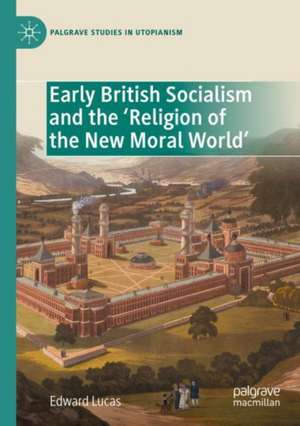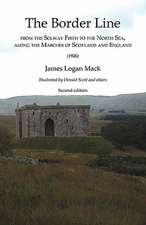Early British Socialism and the ‘Religion of the New Moral World’: Palgrave Studies in Utopianism
Autor Edward Lucasen Limba Engleză Paperback – 28 apr 2024
| Toate formatele și edițiile | Preț | Express |
|---|---|---|
| Paperback (1) | 738.95 lei 38-45 zile | |
| Springer Nature Switzerland – 28 apr 2024 | 738.95 lei 38-45 zile | |
| Hardback (1) | 783.68 lei 6-8 săpt. | |
| Springer Nature Switzerland – 27 apr 2023 | 783.68 lei 6-8 săpt. |
Preț: 738.95 lei
Preț vechi: 812.03 lei
-9% Nou
Puncte Express: 1108
Preț estimativ în valută:
141.40€ • 151.20$ • 117.89£
141.40€ • 151.20$ • 117.89£
Carte tipărită la comandă
Livrare economică 14-21 aprilie
Preluare comenzi: 021 569.72.76
Specificații
ISBN-13: 9783031239427
ISBN-10: 3031239423
Pagini: 278
Ilustrații: V, 278 p.
Dimensiuni: 148 x 210 mm
Ediția:2023
Editura: Springer Nature Switzerland
Colecția Palgrave Macmillan
Seria Palgrave Studies in Utopianism
Locul publicării:Cham, Switzerland
ISBN-10: 3031239423
Pagini: 278
Ilustrații: V, 278 p.
Dimensiuni: 148 x 210 mm
Ediția:2023
Editura: Springer Nature Switzerland
Colecția Palgrave Macmillan
Seria Palgrave Studies in Utopianism
Locul publicării:Cham, Switzerland
Cuprins
1. Introduction.- 2. The State of the Literature.- 3. Reconceiving Religion.- 4. Owenite Socialism in Religious Context.- 5. Owenite Religion as a Socialite Religion.- 6. Religion and the History of Socialism.- 7. Conclusion.
Notă biografică
Edward Lucas completed his DPhil at the University of Oxford, UK and now works for the UK government.
Textul de pe ultima copertă
This book challenges existing accounts of the role of religion in early-nineteenth-century British socialism. Against scholarly interpretations which have identified Owenite socialists as anti-religious or as imitating Christianity, this book argues that Owenites offer a re-conception of the nature of ‘religion’ as advanced through knowledge of the natural and social world, as a prospective source of solidarity which could serve as the unifying bond for communities, and as constituted by ethical conduct. It shows how this re-conception was formed through a sincere and considered reflection upon the problem of religious truth and was shaped by the particular religious context of early-nineteenth-century Britain. It then demonstrates the importance of this reimagination of religion to their understanding of socialism. Their religious interests were not an eccentric adornment to their socialism, an outdated residue yet to be shed and encumbering the development of a mature socialism,or merely instrumental to their temporal goals. Instead, Owenite ambitions of religious reform were grounded in the philosophical preoccupations which animated their socialism.
Edward Lucas completed his DPhil at the University of Oxford, UK and now works for the UK government.
Caracteristici
Clarifies existing scholarship on the relationship between early nineteenth- century British socialism and religion Identifies how early British socialists offer a re-conception of the nature of ‘religion’ Shows how their ambitions of religious reform were grounded in their philosophy of socialism































